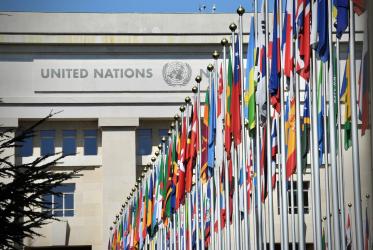In a campaign called simply “United Methodists Stand Against Racism,” the United Methodist Church is offering an array of worship opportunities, prayer gatherings, practical suggestions and other resources.
“We recognize racism as a sin,” reads a statement introducing the campaign. “We commit to challenging unjust systems of power and access.”
Those who join the campaign are collectively working for equality and justice on many fronts. A worship service with the theme “Dismantling Racism: Pressing On to Freedom” will be offered on 24 June, and a denominational “town hall” will be held 1 July. The United Methodist Men already held a national day of prayer on 13 June that focused on invoking change.
The church has also published prayer resources that assist in the spiritual work of overcoming racism. “No justice. No Peace,” a devotion written in response to George Floyd’s murder, asks difficult questions for reflection: “If kneeling is an act of reverence for that which one holds sacred, in honor and is committed in devotion to, what happened on May 25, 2020, in Minneapolis?” the devotion reads. “How does someone kneel on the back of another man’s neck, hear his cries for release from trauma, calling for his mother, and yet continue in this act of worship?”
A United Methodist pastor in Ferguson, Missouri, Rev. F. Willis Johnson, offers advice on how to talk about race. He urges: don’t be quiet.
“Our prayer vigils and moments of silence have become shallow, easy alternatives to actually using our voices as God calls us to do,” Johnson reflects. “We can no longer merely host and organize prayer vigils for reconciling that which we have never experienced. We can't keep preying on each other and then pray for forgiveness.”
He also urges people not to quit. “We can't sit around in our ashes, thinking the time to act has passed, or not yet arrived,” he reflects. "It is not a singular time.”
Tips are also available for talking to children about racism, written by Rev. Ryan Dunn, minister of Online Engagement for Rethink Church. Dunn advises us to let children speak. “Children often express strong realizations of fairness,” Dunn writes. “Let them take the lead on questions pertaining to racism.”
Also, show children how they can help. “Asking children to share their experiences without dismissal provides a sense of empowerment,” Dunn suggests. “Encourage them not to ignore unjust or unfair situations.”








